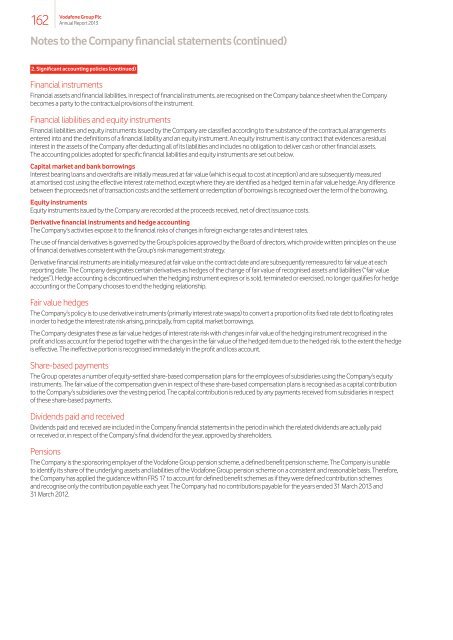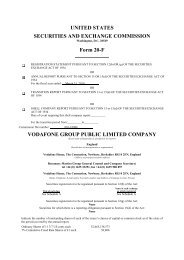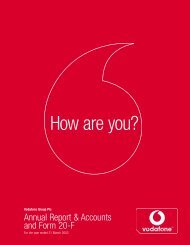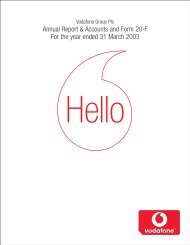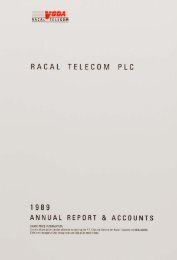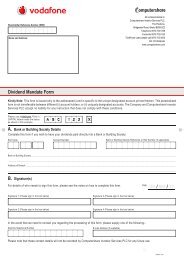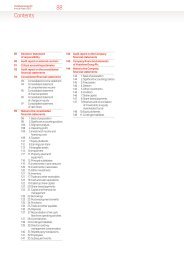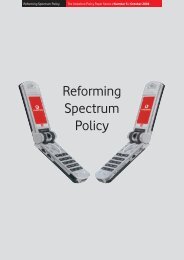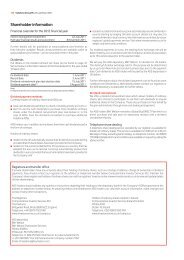The way ahead? - Vodafone
The way ahead? - Vodafone
The way ahead? - Vodafone
You also want an ePaper? Increase the reach of your titles
YUMPU automatically turns print PDFs into web optimized ePapers that Google loves.
162<br />
<strong>Vodafone</strong> Group Plc<br />
Annual Report 2013<br />
Notes to the Company financial statements (continued)<br />
2. Significant accounting policies (continued)<br />
Financial instruments<br />
Financial assets and financial liabilities, in respect of financial instruments, are recognised on the Company balance sheet when the Company<br />
becomes a party to the contractual provisions of the instrument.<br />
Financial liabilities and equity instruments<br />
Financial liabilities and equity instruments issued by the Company are classified according to the substance of the contractual arrangements<br />
entered into and the definitions of a financial liability and an equity instrument. An equity instrument is any contract that evidences a residual<br />
interest in the assets of the Company after deducting all of its liabilities and includes no obligation to deliver cash or other financial assets.<br />
<strong>The</strong> accounting policies adopted for specific financial liabilities and equity instruments are set out below.<br />
Capital market and bank borrowings<br />
Interest bearing loans and overdrafts are initially measured at fair value (which is equal to cost at inception) and are subsequently measured<br />
at amortised cost using the effective interest rate method, except where they are identified as a hedged item in a fair value hedge. Any difference<br />
between the proceeds net of transaction costs and the settlement or redemption of borrowings is recognised over the term of the borrowing.<br />
Equity instruments<br />
Equity instruments issued by the Company are recorded at the proceeds received, net of direct issuance costs.<br />
Derivative financial instruments and hedge accounting<br />
<strong>The</strong> Company’s activities expose it to the financial risks of changes in foreign exchange rates and interest rates.<br />
<strong>The</strong> use of financial derivatives is governed by the Group’s policies approved by the Board of directors, which provide written principles on the use<br />
of financial derivatives consistent with the Group’s risk management strategy.<br />
Derivative financial instruments are initially measured at fair value on the contract date and are subsequently remeasured to fair value at each<br />
reporting date. <strong>The</strong> Company designates certain derivatives as hedges of the change of fair value of recognised assets and liabilities (“fair value<br />
hedges”). Hedge accounting is discontinued when the hedging instrument expires or is sold, terminated or exercised, no longer qualifies for hedge<br />
accounting or the Company chooses to end the hedging relationship.<br />
Fair value hedges<br />
<strong>The</strong> Company’s policy is to use derivative instruments (primarily interest rate swaps) to convert a proportion of its fixed rate debt to floating rates<br />
in order to hedge the interest rate risk arising, principally, from capital market borrowings.<br />
<strong>The</strong> Company designates these as fair value hedges of interest rate risk with changes in fair value of the hedging instrument recognised in the<br />
profit and loss account for the period together with the changes in the fair value of the hedged item due to the hedged risk, to the extent the hedge<br />
is effective. <strong>The</strong> ineffective portion is recognised immediately in the profit and loss account.<br />
Share-based payments<br />
<strong>The</strong> Group operates a number of equity-settled share-based compensation plans for the employees of subsidiaries using the Company’s equity<br />
instruments. <strong>The</strong> fair value of the compensation given in respect of these share-based compensation plans is recognised as a capital contribution<br />
to the Company’s subsidiaries over the vesting period. <strong>The</strong> capital contribution is reduced by any payments received from subsidiaries in respect<br />
of these share-based payments.<br />
Dividends paid and received<br />
Dividends paid and received are included in the Company financial statements in the period in which the related dividends are actually paid<br />
or received or, in respect of the Company’s final dividend for the year, approved by shareholders.<br />
Pensions<br />
<strong>The</strong> Company is the sponsoring employer of the <strong>Vodafone</strong> Group pension scheme, a defined benefit pension scheme. <strong>The</strong> Company is unable<br />
to identify its share of the underlying assets and liabilities of the <strong>Vodafone</strong> Group pension scheme on a consistent and reasonable basis. <strong>The</strong>refore,<br />
the Company has applied the guidance within FRS 17 to account for defined benefit schemes as if they were defined contribution schemes<br />
and recognise only the contribution payable each year. <strong>The</strong> Company had no contributions payable for the years ended 31 March 2013 and<br />
31 March 2012.


